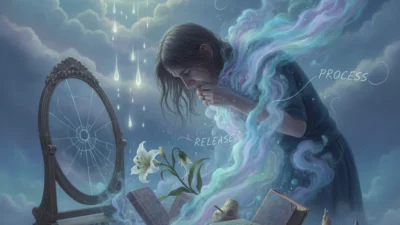When you dream of falling, it often signals feelings of losing control, anxiety, or instability in your waking life. In many interpretations, a falling dream is your subconscious flagging that you feel vulnerable or overwhelmed.
Now let’s dive deeper. This article explores the general meaning of falling dreams, different variations (like falling in water, slipping, being pushed), cultural and historical symbolism, psychological insights, and practical tips for interpreting your own dreams.
Why Falling Dreams Captivate Us
Dreams of falling are among the most vivid, disorienting, and emotionally charged experiences many people report. You feel weightless, helpless, and perhaps panic just before awakening. Because this dream “fills the senses” — motion, fear, gravity — it resonates deeply in our psyche.
The fascination with falling in dream meaning lies in how it bridges the physical (gravity, motion), emotional (anxiety, insecurity), and symbolic realms (loss of control, transition). Across time, cultures and spiritual traditions have treated falling dreams as omens, warnings, or transformative signals.
In what follows, we’ll:
- Examine how psychology and spirituality interpret falling dreams
- Break down common variations and their nuanced meanings
- Survey cultural and historical views on falling symbolism
- Offer guidance on leveraging these dreams for personal insight and growth
- Provide FAQs to address typical questions
By the end, you should not only grasp what falling in dream meaning can suggest—but also how to reflect on your own falling dreams with clarity and purpose.
General Meaning, Symbolism, & Psychological & Spiritual Interpretations
Dream interpreters, psychologists, and spiritual thinkers often see falling dreams as rich, layered messages rather than one-size-fits-all predictions.
Symbolic & Archetypal Meaning
At its core, falling represents loss of control. The sensation of plummeting through space becomes a metaphor for uncertainty, a destabilization of one’s life footing, or fear of failure. Dream analysts like Carl Jung categorized falling as a common “motif” of the unconscious — a symbol that emerges when the ego is threatened or when psychic balance is strained. dreams.co.uk+1
Many spiritual interpretations view falling as letting go of old patterns, surrendering illusions, or entering a transitional phase. In that view, hitting the “ground” may not be failure but the necessary jolting contact with reality.
Psychological & Emotional Interpretation
From a psychological standpoint, falling dreams are often linked to:
- Anxiety, stress, or fear — especially during times of change or instability Healthline+1
- Feelings of insecurity or inadequacy — when internal confidence is shaken Psych Central+1
- A sense of being overwhelmed or unmoored — juggling too much, not knowing which way to go
- Suppressed emotions or unresolved problems — the fall might dramatize inner conflicts or repressed fears Shuteye App+1
Another explanatory model is emotional selection theory: during REM sleep, dreams sometimes “test” emotional schemas under duress (e.g. falling) to help the psyche process stress and build resilience. Wikipedia
Additionally, some falling sensations may be triggered physiologically — such as hypnic jerks (a sudden muscle twitch while drifting into sleep), which can be incorporated into dream content as a fall. Wikipedia+2Centre of Excellence+2
Expert Views & Credibility
PsychCentral notes that while no scientific consensus exists, falling dreams often correlate with feelings of betrayal, lack of control, or anxiety. Psych Central Healthline emphasizes that these dreams may arise during high-stress periods or reflect emotional instability. Healthline
Because dream interpretation is inherently subjective, true expertise lies in combining symbolic frameworks with personal life context. A psychiatrist quoted in Dreams.co.uk warns that meaning shifts depending on how you fall: the height, the speed, the reason, and your reaction matter. dreams.co.uk
In sum, falling in dream meaning often points to internal turbulence, warnings of imbalance, or calls to reexamine how much control (or illusion of control) you’re maintaining in life.
Variations of Falling Dreams: Interpretations (with Positive & Negative Angles)
Below are several common variations of falling in dream meaning, each with their own shades of interpretation. Interpretations are not rigid; your emotions, context, life circumstances, and details matter.: Falling Into Water
Symbolism & Meaning
- Water often symbolizes emotions or the unconscious. So, falling into water may suggest being overwhelmed by feelings or entering deeper emotional states.
- It can also denote cleansing or rebirth if the water is calm, or drowning in emotions if turbulent.
Positive Angle
- You may be entering emotional healing or uncovering deeper self-awareness.
- Letting go of surface-level defenses and accepting vulnerability.
Negative Angle
- You feel engulfed, possibly drowning in stress or emotional turmoil.
- Your subconscious warns you: don’t suppress tough feelings.
H3: Slipping, Tripping, or Losing Footing (a Gentle Fall)
Symbolism & Meaning
- A minor fall can suggest minor setbacks, self-doubt, loss of balance, or hesitancy.
- You may be misstepping in some decision or letting uncertainty trip you up.
Positive Angle
- Recognition of small mistakes or misalignments before they cascade.
- Warning to be more grounded, reassess steps, slow down, and recalibrate.
Negative Angle
- You’re uneasy or fearful of making errors—perhaps perfectionism is weighing on you.
- Fear of failing at small steps might prevent you from progressing.
Being Pushed or Forced to Fall
Symbolism & Meaning
- This variation suggests external pressure, betrayal, or interference.
- Someone or some force may be nudging you off balance, intentionally or not.
Positive Angle
- It may illuminate who or what undermines your sense of stability.
- Offers an opportunity to recognize and resist harmful influences.
Negative Angle
- You may feel powerless, manipulated, or under unjust pressure.
- Emotional pain in relationships or work may be involved.
Falling Forever (Endless Descent)
Symbolism & Meaning
- A perpetual fall indicates ongoing anxiety, fear, or unresolved inner conflict.
- It can feel like you’re spiraling with no apparent end or safe landing.
Positive Angle
- It points to urgent issues in your life needing attention.
- You might be on the brink of a transformational breakthrough if you face the fear.
Negative Angle
- Emotional overload, chronic stress, perhaps a sense of helplessness or despair.
- If recurring, this scenario may signal deeper psychological distress.
Falling from a Great Height (Cliffs, Buildings, Skyscrapers)
Symbolism & Meaning
- A high fall points to lofty goals, status anxiety, big risks, or dramatic change.
- Might highlight your fear of failure at high-stakes levels.
Positive Angle
- The dream is forcing you to confront how high you’ve reached and whether your foundations are solid.
- It can awaken humility or prompt you to steady your aspirations.
Negative Angle
- Anxiety over losing reputation, identity, power, or status.
- A sudden collapse, ruin, or crash if you’re overextending yourself.
Case Study / Realistic Example
Case Study: “Aisha’s Free-Fall Dream”
Aisha, a 29-year-old marketing executive in Lahore, started having vivid dreams of falling from a rooftop. Each time, she’d feel the wind rush past her ears, heart pounding, and wake just before impact. She noted these dreams coincided with her consideration of leaving her stable job to launch her own startup.
Interpreting through falling in dream meaning, Aisha reflected:
- The height of the fall mirrored the risk she contemplated: a leap from corporate comfort to an uncertain future.
- The loss of control in the dream echoed her fears about income stability and failure.
- The repeated nature suggested this was more than random — it was an internal tug-of-war she needed to face.
By keeping a dream journal, she tracked that the dreams eased on nights she meditated or visualized her business plan confidence. She also used mindfulness techniques to temper anxiety before bed. Over a few weeks, the dreams shifted: instead of free-fall, she dreamt of gliding or descending stairs — more controlled and gradual.
In her life, the shift mirrored a mental transition: from fearing the leap to acknowledging the path. Her falling dreams became a catalyst for honest self-inquiry and incremental steps toward her new venture.
This example shows how falling in dream meaning can serve as a mirror to your inner struggle — and how paying attention can support growth.
Cultural & Historical Symbolism of Falling Dreams
Dreams — especially falling — have long held symbolic weight in myth, religion, and folklore across cultures. Understanding these enriches how we view our own nightly visions.
Mythology, Religion & Etymology
- In Greek mythology, the fall often evokes the flight of Icarus: trying to soar too high, ignoring limits, then plummeting. Jungists sometimes see that myth echoed in modern falling dreams (ambition meets hubris). dreams.co.uk
- In religious texts, dreams of falling may warn of spiritual descent or moral imbalance. For instance, some Christian interpretations read falling as symbolic of sin, pride, or the “fall from grace.”
- Etymologically, the word “dream” (Old English drēam) carried meanings of joy and sorrow, reflecting how dreams have always been double-edged — both revelatory and unsettling.
Cultural References & Folklore
- In Eastern traditions, falling dreams can signal loss of harmony, imbalance of yin-yang, or spiritual warning. Shuteye App+1
- In Islamic dream literature, falling can be interpreted depending on direction, what you fall into, and whom you associate with in the dream — sometimes seen as a caution. (Note: specific classical Islamic sources vary.)
- Japanese folklore features the baku, a mythical creature believed to devour nightmares. Though not specific to falling dreams, the tradition underscores how cultures create symbolic protectors of the dream realm. Wikipedia
- In Western literature, the dream of falling is used often as a metaphor for psychological breakdown, loss, or existential insecurity (e.g. in surrealist art, modern novels, films).
Across time, the act of falling in dreams has been seen not simply as fear, but as a narrative of descent, warning, spiritual correction, or initiation. When you dream of falling, you’re touching a symbol that echoes through the ages.
Psychological Insights & Personal Growth Advice
Exploring falling in dream meaning can offer real psychological and personal growth benefits. Here are constructive ways to work with falling dreams:
Dream Journaling & Reflection
- Keep a notebook by your bed. Immediately upon waking, jot down:
- Where you fell from
- What you felt (fear, surrender, relief)
- What you landed on (water, ground, nothing)
- What was happening in your life
Over time, patterns may emerge.
- Revisit your journal weekly and ask: what life areas feel shaky? Where am I feeling out of control?
Mindfulness & Grounding Practices
- In waking life, cultivate grounding rituals: walking barefoot, breathing exercises, body scans. These help stabilize the psyche and can reduce nighttime falling imagery.
- Before bed, do a short guided meditation or visualization where you imagine steadying yourself—rooted, supported, balanced.
Address Life Imbalances & Stress
- Falling dreams often arise during transitions. Identify life areas that need more structure or support: finances, relationships, work.
- Consider talking through your fears with a trusted friend, therapist, or coach — naming what feels unstable often reduces its nocturnal replays.
Use the Dream as a Map, Not a Prophecy
- Don’t take the falling dream literally (as prediction). Instead, use it as a diagnostic tool — what part of life is “out of footing”?
- Turn negative interpretations into invitations for action. For example, if falling reflects overcommitment, you might reduce load or delegate.
By blending psychological awareness, spiritual openness, and consistent practices, your falling dreams can transform from alarming disturbances into helpful signals pointing toward balance, healing, and growth.
FAQs (About Falling in Dream Meaning)
1. Why do I often dream about falling at night?
Frequent falling dreams often correlate with ongoing stress, unresolved emotional conflict, or deep-seated anxiety. Your subconscious may be signaling repeated instability or urging you to address an issue you’ve been avoiding. The Times of India+2Healthline+2
2. Is falling in a dream a bad omen?
Not necessarily. While falling dreams can feel alarming, they tend to reflect internal emotional states rather than literal omens. Interpreting them carefully — considering context, feelings, and life circumstances — is more meaningful than treating them as simply “bad luck.”
3. Can lucid dreaming stop a falling dream?
Yes. If you become aware (lucid) during the fall, you can redirect the dream — slow down, fly instead of fall, or land safely. Lucid dreaming techniques may empower you to reshape the narrative mid-fall.
4. Do falling dreams always mean anxiety?
Often yes, but not exclusively. They might also signal readiness for change, subconscious processing, or a call to surrender control. The emotional tone (panic vs calm) and landing outcome influence the meaning.
5. Should I consult a therapist about recurring falling dreams?
If the dreams are distressing, frequent, interfering with sleep, or tied to trauma, professional support can be helpful. A therapist or dream analyst can help you unpack the underlying emotional content more safely.
6. Does age or gender affect falling dream meaning?
Not directly. While life stage (young adult vs older adult) may affect which life domains feel unstable, the core symbolism of control, fear, and transition tends to persist across demographics.
Conclusion
Falling dreams are among the most visceral, emotionally charged dreams, but they carry far more than random terror. The falling in dream meaning often points to internal instability — anxiety, insecurity, transitions, or overwhelmed psyche. Yet these dreams also offer a doorway: by paying attention, journaling, and reflecting, you can transform them into guides for self-awareness and growth.

James Thornton is a researcher and writer focused on sleep science, lucid dreaming, and the neurological aspects of dream formation. With a strong academic foundation in cognitive science, James specializes in analyzing how dreams influence memory, creativity, and emotional health. His contributions to DreamingSign.com are well-known for their scientific accuracy and thought-provoking insights, helping readers understand the powerful connection between the brain and the dream world.




